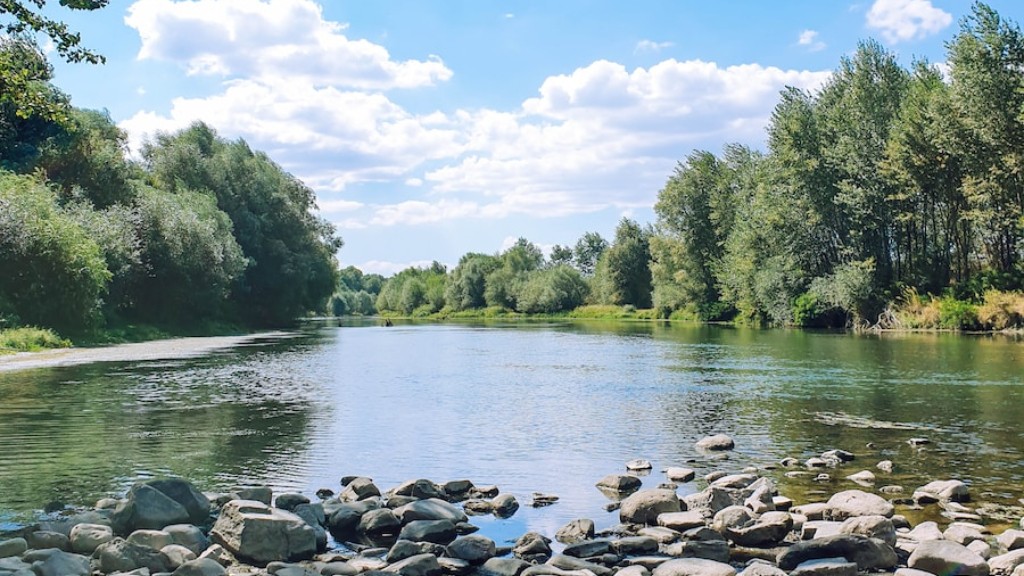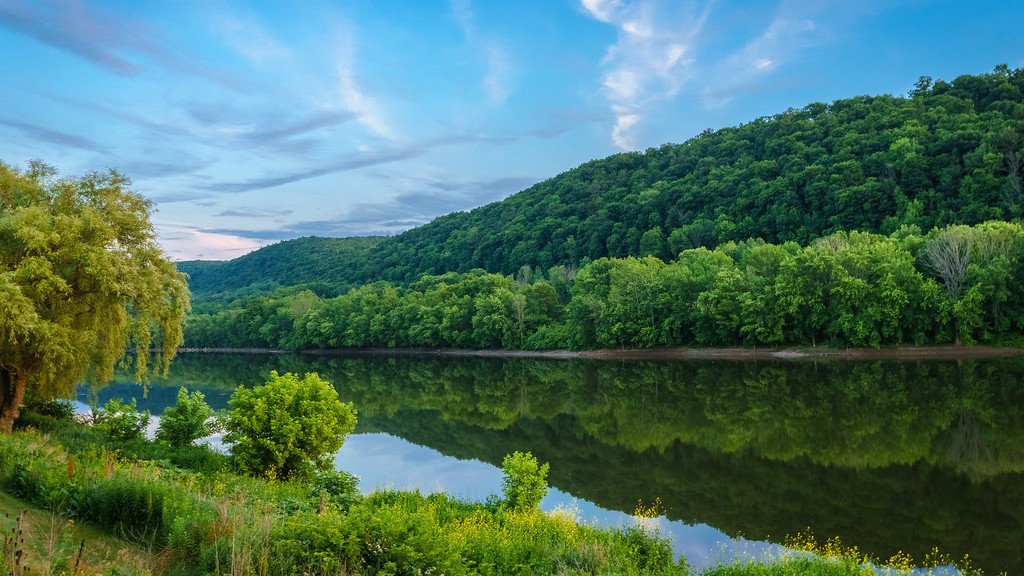The Mississippi River is one of the most dynamic and important bodies of water in America. With its source in Minnesota and mouth in the Gulf of Mexico, it is the fourth longest river in the United States and is essential for transportation, commerce and recreation in the Midwest and Delta regions. According to the Environmental Protection Agency, the Mississippi River drainage area contains 41% of the nation’s population, 31% of its energy infrastructure, and 40% of its grain exports. In recent decades, however, the health and helpfulness of the Mississippi River has been put in jeopardy by numerous environmental threats.
One of the main causes of damage to the ecology of the Mississippi River is from pollutants and other hazardous substances. A major cause of this is agricultural runoff, which often carries fertilizers and pesticides that can have a toxic and even fatal effect on aquatic creatures. Also, industrial runoff often contains heavy metals, oil, and other toxic substances that can contaminate the vegetation, fish, and other organisms in the river.
In addition to industrial and agricultural runoff, the Mississippi River is increasingly being hit by flooding. As the earth warms, more intense rain and snowfall is leading to more frequent and powerful flooding along the Mississippi River. These floods can be destructive, leaving debris and broken levees behind, and also trigger disturbances that can last for years.
The Mississippi River provides important recreational benefits, from fishing, hunting and camping to canoeing, kayaking and water-skiing. However, activities like these are being increasingly restricted due to the increasing frequency and intensity of the floods and the health risks associated with pollution in the river. Also, the ecological richness of the land surrounding the river is being increasingly threatened by the same factors.
Experts have also drawn attention to the role of the Army Corps of Engineers in contributing to the decline in the health of the Mississippi River. The Corps built thousands of levees in the late 19th and early 20th centuries which drastically modified the course of the river and limited the natural flooding cycle which keeps the river full of sediment and vegetation.
These actions have had a damaging effect on the environment of the Mississippi River, diminishing habitats, disrupting the natural water cycle, and leading to increased erosion along the river banks. The Army Corps of Engineers attempted to mitigate this damage by constructing sediment-trapping rock dikes, but the process was limited and even this effort was not sustained.
The effects of climate change on the Mississippi River are being felt in the form of more frequent and intensive floods, which are making it difficult for people to enjoy the recreational possibilities of the river. In addition, the health of the river and its aquatic creatures is being put in jeopardy due to pollutants from industrial and agricultural sources. Finally, the role of the Army Corps of Engineers in contributing to the decline in the health of the river must be taken into consideration as well.
Pollution
Pollution is a major threat to the health of the Mississippi River and its aquatic creatures. Agricultural runoff carries toxic fertilizers and pesticides that can have a detrimental effect on aquatic creatures. Industrial runoff is also to blame, carrying hazardous substances such as heavy metals, oil and other toxic substances that can contaminate vegetation, sediment, fish and other organisms. In order to protect the Mississippi River and its aquatic life, stronger regulations must be put in place to prevent these dangerous pollutants from entering the water.
Cleanup efforts are already underway, led by both governmental and non-profit organizations. The Mississippi River Basin Alliance, for example, is working to reduce nutrient and pesticide runoff from agricultural operations by promoting more sustainable farming practices, as well as encouraging private and public organizations to work together for the health of the river. However, more needs to be done to make sure that these problems are addressed and that the clean up efforts are successful.
The government should also take more responsibility for the health of the Mississippi River by setting stricter regulations on industrial and agricultural operations and enforcing those regulations. By doing this, they can help to reduce the amount of pollutants entering the river and also ensure that those responsible for the pollution are held accountable.
Flooding
The Mississippi River is increasingly being hit by more frequent and powerful flooding due to changes in the climate. The floods can cause immense devastation, leaving debris and broken levees behind, and can trigger long term disturbances. In order to manage this problem, efforts must be made to better prepare for and respond to these floods. New strategies and technologies are needed in order to better manage water resources, reduce the risk of flooding, and restore damaged areas.
The Army Corps of Engineers is leading the efforts to reduce flooding along the Mississippi River by constructing and maintaining levees, dams, and levee systems to hold back floodwaters. They are also launching initiatives to restore wetlands, which naturally act as a buffer against floods and help absorb excess water. In addition to these efforts, the organization is also encouraging the public to engage in activities like planting trees and shrubs, and building rain gardens to help reduce the chances of flooding.
Other organizations, such as the Mississippi River Basin Alliance, are also working to better prepare communities for flooding. The Alliance has launched an online platform to provide resources, tools, and information to help individuals protect their property and livelihoods from inundation. The organization has also provided assistance in the form of grants and financing programs to support businesses and communities affected by flooding.
The government also has a role to play in managing and responding to floods. They should ensure that the regulations for building construction and development remain stringent, and more emphasis should be placed on developing strategies for flood protection and response. The government should also provide adequate funding to support flood reforms and improve flood risk tools and technology.
Recreation
The Mississippi River provides important recreational benefits, but activities like fishing, hunting and camping are being increasingly restricted due to the increasing frequency and intensity of floods and the health risks associated with pollution in the river. In order to improve the recreational opportunities of the Mississippi River, there should be a greater focus on restoring and protecting the ecological richness of the land surrounding it.
Organizations such as the Mississippi River Basin Alliance are supporting on-the-ground efforts to preserve and restore wildlife habitats, wetlands, and coastal areas that provide recreational activities and support the health of the river and its ecosystem. The Alliance is also working with local communities to promote sustainable practices in and around the river, such as limiting pollutants and runoff and increasing green space.
The government should also do more to promote sustainable recreation along the Mississippi River. They should create more access points along the length of the river to improve recreational opportunities and should provide more funding for conservation and restoration projects. In addition, regulations should be put in place to limit recreational activities that have a negative impact on the river’s ecosystem, such as power boating and jet skiing.
Army Corps of Engineers
The Army Corps of Engineers has played a major role in the decline of the health of the Mississippi River. Their levee construction drastically altered the course of the river and limited the natural flooding cycle, leading to increased erosion and habitat destruction. As a result, sediment-trapping rock dikes were built to attempt to mitigate the damage, but this effort was not fully successful.
The Army Corps of Engineers should take more responsibility for the health of the Mississippi River. They should review their current practices and re-evaluate their development strategies. The organization should also increase their efforts to restore and preserve habitats and wetlands along the river, as well as to increase the effectiveness of their sediment-trapping measures.
The government should also take a more active role in this process. They should provide adequate funding for programs that focus on the restoration and preservation of habitats and wetlands, and for initiatives that promote green space and sustainable practices around the river. They should also increase the regulations on the Corps of Engineers and better enforce the regulations on industrial and agricultural operations.
Conclusion
The health of the Mississippi River is in jeopardy due to various factors such as pollution, flooding, and the actions of the Army Corps of Engineers. In order to protect the river, stronger efforts must be made to reduce and eliminate pollutants, to better prepare and respond to flooding, and to promote sustainable recreation. In addition, the Army Corps of Engineers should take more responsibility for the health of the river, and the government should increase their oversight and enforcement of regulations.





